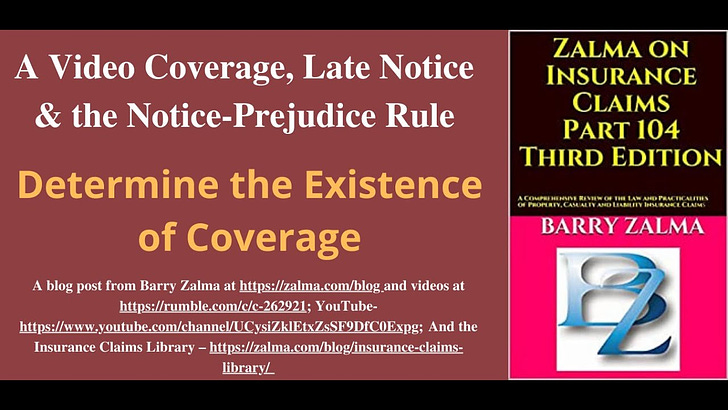Read the full article at https://www.linkedin.com/pulse/coverage-late-notice-notice-prejudice-rule-barry-zalma-esq-cfe and see the full video at
and at https://rumble.com/c/c-262921 and https://zalma.com/blog plus more than 3850 posts.
Posted on August 26, 2021 by Barry Zalma
See the full video at and at https://rumble.com/c/c-262921
A key obligation of an insurance claims person is to establish, through a thorough investigation with the assistance of the insured and the records of the insurance company, that coverage exists for a loss once it is reported to the insurer. Often, insurers are faced with insureds who fail to report losses promptly. Some fail to report until after an adverse verdict at trial. Courts differ on the proper method of dealing with late reports of loss and claims depending on the policy wording and the law of the jurisdiction.
The insured, who reports a claim late, will always claim that the insurer was not prejudiced by the delay and, as a result, they did not breach the notice condition of the policy.
The Notice-Prejudice Rule
Many courts across the country have struggled for years with the issue of insureds who fail to promptly report a loss. Over those years, a doctrine of insurance law has developed, known as the “notice-prejudice rule.” The United States Supreme Court stated it as follows:
California’s notice-prejudice rule requires an insurer to prove that the insured’s late notice of a claim has substantially prejudiced its ability to investigate and negotiate payment for the insured’s claim. A finding of substantial prejudice will generally excuse the insurer from its contractual obligations under the insurance policy, unless the insurer had actual or constructive knowledge of the claim. [Shell Oil Co. v. Winterthur Swiss Ins. Co. (1993) 12 Cal.App.4th 715, 760-763, 15 Cal.Rptr.2d 815; Pitzer Coll. v. Indian Harbor Ins. Co., 8 Cal.5th 93, 447 P.3d 669, 251 Cal.Rptr.3d 701 (Cal. 2019)] The rule is applied universally to third party policies—except “claims made” policies [see detail below].
Many jurisdictions, including South Carolina, judicially adopted a notice-prejudice rule, whereby the insurer had the burden to show that it was substantially prejudiced by the failure of its insured to comply with the notice and cooperation provisions. [Vermont Mut. Ins. Co. v. Singleton By & Through Singleton, 316 S.C. 5, 12, 446 S.E.2d 417, 421 (1994)] Where the rights of innocent parties are jeopardized by a failure of the insured to comply with the notice requirements of an insurance policy, the insurer must show substantial prejudice to the insurer’s rights before it refuses to defend or indemnify the insured.
When the Notice Prejudice Rule Doesn’t Apply
The notice-prejudice rule does not apply to a date-certain notice requirement in a claims-made insurance policy. In a claims-made policy, the date-certain notice requirement defines the scope of coverage. Thus, to excuse late notice in violation of such a requirement would rewrite a fundamental term of the insurance contract.
Applying the notice-prejudice rule to the date-certain notice requirement in a claims-made policy would alter the parties’ agreed allocation of risk. In short, to excuse late notice in violation of such a requirement would alter a basic term of the insurance contract. Furthermore, it would prevent parties from defining coverage with certainty, no matter how definitive or express the notice requirement. Such a result would significantly diminish the advantages of claims-made policies for both insurers and insureds: insurers could no longer “close the books” on previous policy periods, and policy premiums presumably would rise to account for the risk that an insured might notify the insurer of a claim after the policy period has expired. Even if insurers could somehow compensate for the additional risk, extending the notice-prejudice rule to the date-certain notice requirement of claims-made policies likely would decrease the availability of this type of insurance product in Colorado. In light of our state’s policy favoring freedom to contract, this is something we decline to do.
© 2021 – Barry Zalma
Barry Zalma, Esq., CFE, now limits his practice to service as an insurance consultant specializing in insurance coverage, insurance claims handling, insurance bad faith and insurance fraud almost equally for insurers and policyholders.
He also serves as an arbitrator or mediator for insurance related disputes. He practiced law in California for more than 44 years as an insurance coverage and claims handling lawyer and more than 54 years in the insurance business.
He is available at http://www.zalma.com and zalma@zalma.com. Mr. Zalma is the first recipient of the first annual Claims Magazine/ACE Legend Award. Over the last 53 years Barry Zalma has dedicated his life to insurance, insurance claims and the need to defeat insurance fraud. He has created the following library of books and other materials to make it possible for insurers and their claims staff to become insurance claims professionals.
Go to the podcast Zalma On Insurance at https://anchor.fm/barry-zalma; Follow Mr. Zalma on Twitter at https://twitter.com/bzalma; Go to Barry Zalma videos at Rumble.com at https://rumble.com/c/c-262921; Go to Barry Zalma on YouTube- https://www.youtube.com/channel/UCysiZklEtxZsSF9DfC0Expg; Go to the Insurance Claims Library – https://zalma.com/blog/insurance-claims-library/ The last two issues of ZIFL are available at https://zalma.com/zalmas-insurance-fraud-letter-2/ podcast now available at https://podcasts.apple.com/us/podcast/zalma-on-insurance/id1509583809?uo=4





